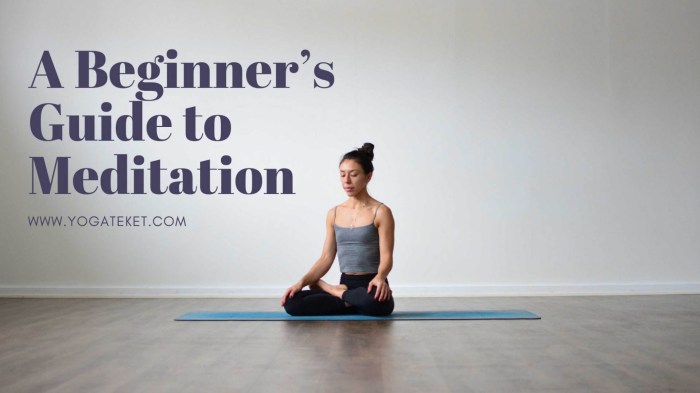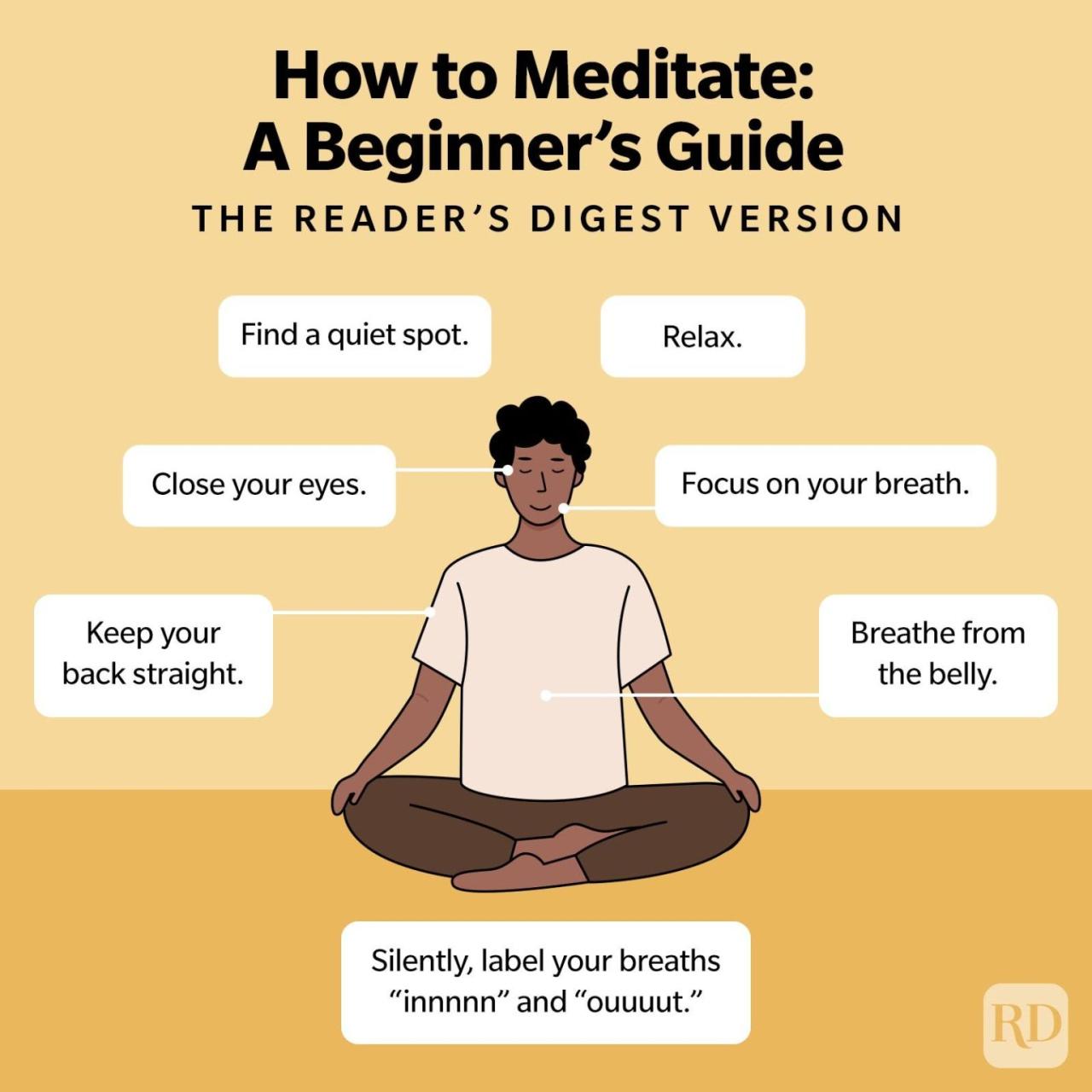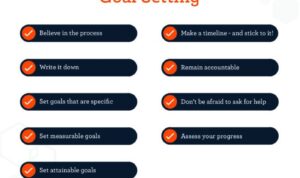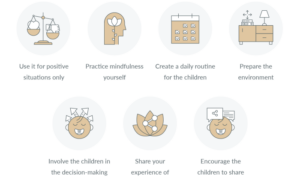Meditation for Beginners: Your Path to Inner Peace takes you on a journey to discover the art of meditation, exploring its benefits and techniques in a way that’s easy to grasp and implement. Get ready to embark on a transformative experience!
In this guide, we’ll delve into the world of meditation, breaking down misconceptions, exploring different techniques, setting up the perfect meditation space, establishing a routine, and understanding the link between mindfulness and meditation for beginners. Let’s unlock the secrets to a calmer mind and a more balanced life.
Introduction to Meditation for Beginners

Meditation is a practice that involves focusing your mind and eliminating the stream of thoughts that may be crowding your head. It is a way to train your mind to be more present and aware of the moment, rather than getting lost in worries about the past or future. For beginners, meditation can offer a range of benefits, including reducing stress, improving concentration, enhancing self-awareness, and promoting emotional health.
Benefits of Meditation for Beginners
- Stress Reduction: Meditation can help beginners to manage stress by calming the mind and promoting relaxation.
- Improved Concentration: Practicing meditation regularly can enhance focus and attention span for beginners.
- Emotional Well-being: Beginners can experience greater emotional stability and resilience through meditation.
Importance of Meditation for Overall Well-being
- Physical Health: Meditation can lower blood pressure, improve sleep, and boost the immune system for beginners.
- Mental Clarity: Beginners can experience improved decision-making and problem-solving skills through meditation.
- Spiritual Growth: Meditation can help beginners connect with their inner selves and explore deeper aspects of life.
Common Misconceptions about Meditation for Beginners
- Meditation is only for “spiritual” people: In reality, anyone can practice meditation, regardless of their beliefs or background.
- You need to clear your mind completely: Beginners often think they need to have a completely empty mind during meditation, but it’s normal for thoughts to come and go.
- You need a lot of time: Even just a few minutes of meditation each day can be beneficial for beginners, so it’s not necessary to spend hours sitting in silence.
Types of Meditation Techniques
Meditation offers a variety of techniques, each with its unique focus and benefits. Here are some popular meditation techniques suitable for beginners:
Mindfulness Meditation, Meditation for Beginners
- Mindfulness meditation involves focusing on the present moment without judgment.
- Benefits include reduced stress, improved focus, and increased self-awareness.
- Practitioners observe their thoughts and emotions without getting caught up in them.
Loving-Kindness Meditation
- Loving-kindness meditation focuses on cultivating feelings of love and compassion towards oneself and others.
- Benefits include increased empathy, reduced negative emotions, and improved relationships.
- Practitioners repeat phrases of well-wishes for themselves and others.
Body Scan Meditation
- Body scan meditation involves systematically scanning the body from head to toe, focusing on each body part with awareness.
- Benefits include relaxation, stress relief, and body awareness.
- Practitioners observe sensations in each part of the body without judgment.
Setting Up a Meditation Space
Creating a peaceful and comfortable meditation space at home is essential for beginners to fully immerse themselves in their practice. A quiet environment plays a crucial role in helping beginners focus and relax during meditation. Here are some tips and ideas for setting up a meditation space:
Choosing the Right Location
When selecting a location for your meditation space, opt for a quiet area in your home where you can relax without distractions. Consider natural light, ventilation, and a comfortable seating arrangement to enhance your meditation experience.
Decorating Your Space
Decorate your meditation space with elements that promote relaxation and tranquility. Incorporate calming colors, such as light blues or greens, and add plants or candles to create a soothing atmosphere. Consider using cushions or a meditation mat for added comfort during your practice.
Organizing Your Space
Keep your meditation space organized and clutter-free to maintain a sense of calm and serenity. Use storage solutions like baskets or shelves to store meditation props and accessories neatly. Consider adding a small table or shelf for essential items like candles, incense, or a meditation timer.
Personalizing Your Space
Make your meditation space your own by adding personal touches that bring you joy and inspiration. Display meaningful objects, such as crystals, statues, or inspirational quotes, to create a space that feels sacred and inviting. Experiment with different decorations and arrangements until you find what resonates with you.
Establishing a Meditation Routine: Meditation For Beginners

Consistency is key when it comes to meditation practice, especially for beginners. By establishing a daily routine, you can build a strong foundation for your practice and experience the full benefits of meditation.
Starting a Daily Meditation Routine
Beginners can start by setting aside a specific time each day for meditation. Choose a time when you are least likely to be interrupted and can fully focus on your practice. Start with short sessions, gradually increasing the duration as you become more comfortable.
- Set a specific time each day for meditation.
- Start with short sessions and gradually increase the duration.
- Create a peaceful and comfortable space for meditation.
- Use reminders or alarms to stay consistent with your practice.
Maintaining a Daily Meditation Routine
To maintain a daily meditation routine, it’s essential to stay committed and motivated. Find a practice that resonates with you and brings you joy. Keep track of your progress and celebrate small milestones along the way.
- Stay committed and motivated to your practice.
- Experiment with different meditation techniques to find what works best for you.
- Track your progress and celebrate small achievements.
- Join a meditation group or class for added support and accountability.
Overcoming Common Challenges
It’s common to face challenges when establishing a meditation routine, but with perseverance and dedication, you can overcome them. Recognize obstacles such as lack of time or distractions, and find creative solutions to address them.
- Identify common challenges like lack of time or distractions.
- Practice self-compassion and patience as you navigate through challenges.
- Stay flexible with your routine and adapt to changes when needed.
- Seek guidance from experienced practitioners or teachers for support.
Mindfulness and Meditation
Mindfulness and meditation are often used interchangeably, but they are actually two distinct practices. While meditation is the act of focusing the mind on a particular object, thought, or activity to train attention and awareness, mindfulness involves being fully present and aware of the current moment without judgment.
How Mindfulness Complements Meditation
- By incorporating mindfulness into meditation, beginners can enhance their ability to stay focused and present during their practice.
- Mindfulness helps beginners become more aware of their thoughts, emotions, and bodily sensations, which can deepen their meditation experience.
Examples of Integrating Mindfulness into Daily Activities
- Practicing mindful breathing while walking to class or work can help beginners stay grounded and focused throughout the day.
- Taking a few moments to mindfully eat a meal can not only enhance the eating experience but also cultivate a sense of gratitude and awareness.
- Engaging in mindful listening during conversations with friends or family members can improve communication and connection.
Benefits of Meditation for Beginners
Meditation offers a wide range of benefits for beginners, encompassing physical, mental, and emotional well-being. By incorporating regular meditation practice into their routine, beginners can experience transformative effects that enhance their overall quality of life.
Stress Management
- Meditation can help beginners manage stress by promoting relaxation and reducing the production of stress hormones like cortisol.
- Regular practice of meditation techniques such as deep breathing and mindfulness can create a sense of inner peace and calmness, allowing beginners to navigate stressful situations with greater ease.
Improved Focus
- Beginners who engage in meditation may notice improvements in their ability to focus and concentrate.
- By training the mind to stay present and focused during meditation sessions, beginners can carry over this heightened focus into daily tasks and activities.
Enhanced Well-being
- Through meditation, beginners can cultivate a greater sense of self-awareness and self-compassion, leading to improved emotional well-being.
- Practicing meditation regularly can also boost feelings of gratitude, positivity, and overall happiness in beginners.


